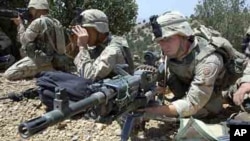Afghan President Hamid Karzai is set to meet in Washington Thursday with U.S. Defense Secretary Leon Panetta and Secretary of State Hillary Clinton, as the Obama administration deliberates the U.S. military future in Afghanistan.
Karzai is set to meet with Panetta early in the day Thursday, following a full military honors ceremony to welcome him to the Pentagon.
He is scheduled to meet with Secretary Clinton in the early evening and will then join her for a working dinner.
Karzai's talks at the Pentagon and the State Department come one day ahead of a one-on-one meeting with U.S. President Barack Obama. The two leaders are expected to discuss security issues, namely how many U.S. troops might be stationed in Afghanistan after the majority pull out in 2014, and under what conditions.
Current plans call for the United States to withdraw nearly all of its 68,000 troops from Afghanistan by the end of 2014.
But that plan hinges on a number of conditions, including whether Afghan forces will be capable of taking over security at that time. It is also not clear what would be the role of the Americans who stay behind, if any do remain.
Some analysts believe the Taliban may be plotting a comeback and is just waiting for U.S. and other Western forces to leave.
Retired U.S. Army Colonel Thomas Lynch, one of the authors of a new book about Afghanistan and its future called Talibanistan, says plans for a U.S. withdrawal from Afghanistan may be premature.
"I personally believe that the dynamics in Afghanistan and the dynamics in the region right now are not well-suited for a precipitous or complete withdrawal of American or Western forces," said Lynch. "I think the Afghan national army and its security forces still need a lot of assistance - logistical training and some operational. I think there still needs to be partnership with Afghan counterterrorist units and American and Western counterterrorist units."
Another contributor to Talibanistan, Brian Fishman, a counterterrorism expert with the New America foundation, sees a gloomy and dangerous future for the Afghans if the United States leaves.
"I am quite pessimistic about the Afghan government. And I don't think what we will see is the Taliban rushing with armored columns back into Kabul. But I do think that civil war in Afghanistan is a real possibility in the years after an American withdrawal, particularly if the money stops flowing the way that it did after the Soviets left," said Fishman.
While President Karzai has often criticized U.S. actions in Afghanistan, he also has spoken about his desire for some U.S. presence to remain.
Karzai is set to meet with Panetta early in the day Thursday, following a full military honors ceremony to welcome him to the Pentagon.
He is scheduled to meet with Secretary Clinton in the early evening and will then join her for a working dinner.
Karzai's talks at the Pentagon and the State Department come one day ahead of a one-on-one meeting with U.S. President Barack Obama. The two leaders are expected to discuss security issues, namely how many U.S. troops might be stationed in Afghanistan after the majority pull out in 2014, and under what conditions.
Current plans call for the United States to withdraw nearly all of its 68,000 troops from Afghanistan by the end of 2014.
But that plan hinges on a number of conditions, including whether Afghan forces will be capable of taking over security at that time. It is also not clear what would be the role of the Americans who stay behind, if any do remain.
Some analysts believe the Taliban may be plotting a comeback and is just waiting for U.S. and other Western forces to leave.
Retired U.S. Army Colonel Thomas Lynch, one of the authors of a new book about Afghanistan and its future called Talibanistan, says plans for a U.S. withdrawal from Afghanistan may be premature.
"I personally believe that the dynamics in Afghanistan and the dynamics in the region right now are not well-suited for a precipitous or complete withdrawal of American or Western forces," said Lynch. "I think the Afghan national army and its security forces still need a lot of assistance - logistical training and some operational. I think there still needs to be partnership with Afghan counterterrorist units and American and Western counterterrorist units."
Another contributor to Talibanistan, Brian Fishman, a counterterrorism expert with the New America foundation, sees a gloomy and dangerous future for the Afghans if the United States leaves.
"I am quite pessimistic about the Afghan government. And I don't think what we will see is the Taliban rushing with armored columns back into Kabul. But I do think that civil war in Afghanistan is a real possibility in the years after an American withdrawal, particularly if the money stops flowing the way that it did after the Soviets left," said Fishman.
While President Karzai has often criticized U.S. actions in Afghanistan, he also has spoken about his desire for some U.S. presence to remain.












